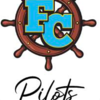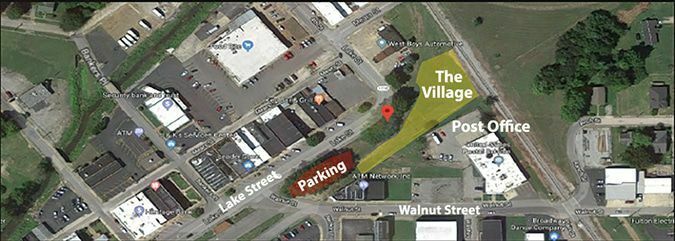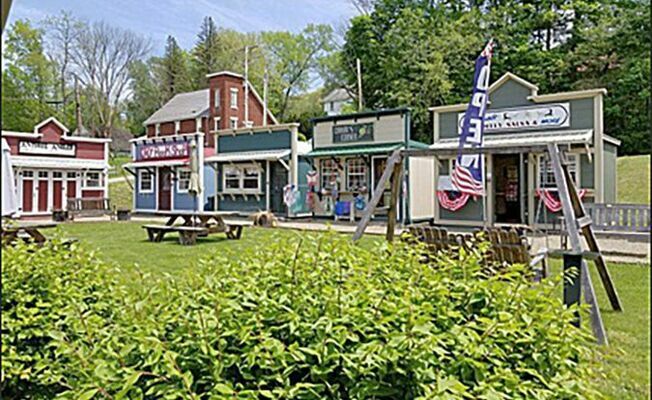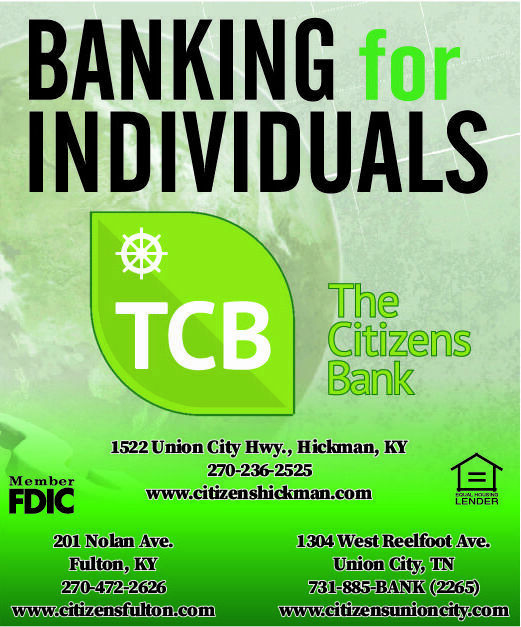Tourism Commission hears presentation on ‘The Village’
The Fulton Tourism Board met March 14, with Board Members John Gambill, Peggy Tribble, Bob Shelton, Terri Harvey, Melanie Gunn, and Pat Frazier attending.
The Financial Report for February, shows the Tourism Board has $6,000 budgeted for the Hotel/Motel tax and have already collected $5,453 on month eight. The Restaurant tax was budgeted for $78,000, with 36% remaining to reach that amount, with five months left.
Fulton City Manager Mike Gunn reported, “There is roughly $230,000 in reserves stored.”
Gambill updated the board, that, “The Christmas tree has been ordered and will take approximately 30 – 60 days to arrive.”
Frazier asked if the tree would fade like other artificial Christmas trees?
Gambill informed the group, “It is an expandable tree, starting at 14 foot and can grow. It has a metal hoop system with metal panels, fitting in with lights.”
City Manager Gunn stated he believed the panels could be replaced if they fade.
Frazier asked what kind of light bulbs are on the tree and was told they are LED. She also wanted to know if they are the “big bulbs” because the Lion’s Club would like to sell a yellow light in memory of someone, especially the military.
Gunn reported someone with the Lion’s Club had asked about putting a tree in Pontotoc Park and City Park and lighting with yellow lights and he is still working on the project.
It was reported if the Lion’s or Rotary Clubs would like to help, they could help purchase more panels to make the tree larger.
The initial cost for the startup tree is $3,000 on sale. The Board also discussed purchasing another tree instead of adding to this year’s tree.
The Tourism Board approved the Railroaders Agreement for use of Lohaus Field under the following terms and conditions:
The contract and agreement shall pertain to the period from May 15, 2019 – Aug. 31, 2024; Railroaders shall pay $1 per baseball game played on the field, including regular season and tournament games; any marketing, advertising promotions or special events sponsored by Fulton Tourism hall be previously agreed upon by both parties as no cost to either party; Improvements made to the premises by the Railroaders shall remain at Lohaus Field and become part of the premises and shall not be removed at the end of the contract and agreement (any trade fixtures will be considered personal property of the Railroaders, i.e., concession stand equipment and other movable equipment, etc.); Railroaders have the right to charge admission to games at deemed appropriate for its needs;
Railroaders may sell advertising for fences and other areas of the stadium, as well as promoting sponsorship nights, special events, etc., subject to site restrictions, subject to Fulton Tourism; Railroaders have the right and authority to enter into agreements with additional parties, and shall indemnify Fulton Tourism, The Railroaders, and the City of Fulton for any and all liability during the period of their use of Lohaus Field; Railroaders have the right to sell concessions in the main concession area and is held responsible for maintain the area, inventory and equipment, which is personal property of The Railroaders, with concession inventory, equipment and promotional supplies are the sole responsibility of The Railroaders;
The Railroaders are responsible for any and all field preparation for its games. Field preparation necessary for use of the facility by Additional Parties shall be the responsibility of said Additional Parties. The Railroaders are responsible for the maintenance and preservation of the facility and all Additional Parties whom make use of Lohaus Field; if field and grandstand are not properly maintained, and any costs incurred to cure the problem will be at the expense of the last party to use the facility prior to discovery of the problem.
Gunn presented the Board will a possible tourism/commercial project within the city of Fulton.
The proposed project is based on Tionesta, Pennsylvania’s Market Village.
The Board will decide on a name when the plan develops.
“The Village”, as it is now being called, will help economic development through retail development and help home artisans currently operating out of their home and on the internet, who need a small place to start their business.
Gunn stated, “We have empty lots in downtown Fulton and this project would help fill those lots with attractive things for people to visit.”
“If the Tourism Board decides to do this, we would create a mini market, giving visitors a place to stop, shop, and relax. Hopefully it will be an incubator to get them into a larger building later,” stated Gunn.
“The Village” could possibly be open year around, but now they could be open from March to December.
“The Village” is basically garden sheds turned into incubators for small business, in conjunction with the Tiny Home movement now trending and gaining ground.
A standard garden shed with an 1800 style façade front, with electrical wiring, insulation and prefab for heat and air, is what is planned for the buildings.
It was suggested have a clause in the rental agreement that all buildings would be open at the same time.
A deck/stage could be in the center for events such as a wine tasting or cooking demonstration, police could perform bicycle safety or fingerprinting station. Benches could be placed around the trail for visitors to sit.
The benefits of the project include a failure will not be a financial catastrophe, it takes a few thousand dollars instated of tens of thousands to get started, could be a stepping stone to a larger business, and the project converts an empty lot into a lively business place.
More traffic to the area would also help other businesses in the downtown area of Lake Street, Gunn said.
Gunn stated he has been looking at an area between Lake Street and Walnut Street, behind the Post Office.
His proposal includes putting in a 20-bay parking area, which has already been discussed, for 10 buildings, possibly squeezing in a couple of others, along with a bathroom facility, which will cost more, but would be nicer than portable facilities.
If the project were to fail, the bathroom facilities could be moved to another location like the park and the buildings sold off.
The Board would need to do more planning, budget preparation, set a cost of rent, vendor rules and application process, lease agreements, land ownership, and meeting with vendors for more input.
A green chain-link fence would be erected along the railroad track for safety, and to help with vandalism.
Gunn states the project will cost the Tourism Board going in, but with the rent from the buildings, it may take 10 years, but it will eventually pay for itself.
Plans are to install plumbing into a couple of the buildings.
“I’m still waiting on Premier Portable Buildings to get back with a price quote, for 10 – 15 buildings,” stated Gunn.
Customers could share a shed to help each other keep the store open.
Gunn said he would like to have it opened in time for the Banana Festival, but it may be next Spring before it is a reality.
Also discussed was putting up a pavilion for a Farmer’s Market to utilize for selling space, not out of the back of trucks.
Things to consider regarding the project was the Occupational License and Chamber dues in the rent.
Someone would need to be in charge of clean-up and removing trash, one main electrical meter for the whole “Village” could be considered, Gunn said, and include electricity could be included in the rent.
Gunn said, “At some point, I will come back for you to approve us a budgetary item. It will be above your budget and at the end of the year we would do an amendment to the budget and spend money out of the reserve for this project. Next year’s budget, or when we get it going, you could see an income and expense item for “The Village”.”
Please support The Current by subscribing today!
You may also like:





